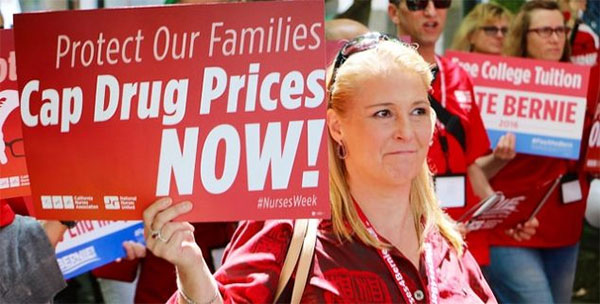News
Nurses: Time to cut drug prices

The best argument for passing Proposition 61 to cut drug prices in California, may be SB 1010, a modest effort to require the drug manufacturers give more notice and some justification when jacking up prices.
Though the bill would not have actually cut prices, it drew ferocious opposition from a who’s who list of major pharmaceutical firms. They won. As the session drew to a close in August, Assembly members attached amendments that so gutted the intent that state Sen. Ed Hernandez pulled the plug and dropped the bill.
A similar fate befell AB 463 in January which merely required drug companies to report on drugs costing more than $10,000 a year. AB 463 couldn’t even get out of the heavily Democratic Assembly Health Committee.
Congress has tried repeatedly, without success, to grant Medicare the power to negotiate bulk price discounts, the means other countries employ to keep drug prices far lower than we pay in the U.S. It’s a position now supported by an astounding 82 percent of Americans, according to a new Kaiser Family Foundation poll.
But in the U.S., the pharmaceutical industry has spent $3.4 billion in federal lobbying since 1998. That’s more than the oil and gas companies, more than the banks, more than any other sector, to bully lawmakers and successfully strangle any reforms, including giving Medicare the power to negotiate prices, or allowing Americans to buy medication at much cheaper costs from Canada.
Even in California, with large Democratic majorities in the Assembly and Senate, we can’t count on our elected leaders to stand up to the drug giants.
Today, that leaves only two choices. We can vote Yes on Prop. 61, which will lower prices for Californians by directing the state to pay no more for medications for patients it covers than the prices paid by the Department of Veterans Affairs – and save the state billions of dollars in drug purchases.
Or we can continue to accept an immoral status quo in the vain hope that some day our legislators will actually defy a drug cartel that ought to star in the next season of Netflix’ “Narcos”.
Registered nurses see the consequences of our failure to act.
Families who say they can’t afford the co-pays for the medications their children need to continue treatment for illnesses like leukemia and face becoming homeless or giving up other basic necessities to care for their child. While the price of a drug like Gleevac, for leukemia patients, has shot up from $26,400 for an annual treatment regimen in 2001 to $120,000 today.
Or diabetic patients admitted to the hospital with elevated blood glucose levels because they couldn’t afford their medications while insulin prices soared 62 percent from 2011 to 2013 and from 33 to 107 percent from 2013 to 2015. A diabetic who rations their insulin can suffer organ damage, blindness, loss of limbs, heart attacks or strokes.
If you think the gargantuan profits – $1.6 trillion for the world’s top 50 pharmaceutical giants the past 20 years – are being put back into developing cures for cancer or vaccines for the latest epidemics, think again.
Most of the profits go to shareholders. Nearly all drug companies spend more, usually far more, on marketing than research, as anyone who owns a television has probably noticed.
Typically the research goes for “evergreening,” minor variations of existing drugs that can then be re-patented and re-sold at huge markups, and all the law requires is not whether the drug is an actual improvement, but that it is “better than a placebo.”
And much of the research is funded by taxpayers and conducted at public universities. Yes, we all pay the drug piper twice, at the pharmacy counter, and at tax time.
Those profits also swell the nearly $100 million war chest accumulated by the drug firms for their campaign to mislead voters on Prop. 61.
Despite the deceit, drug costs cannot be arbitrarily raised for veterans, the lower prices veterans pay are protected by federal law. Threats to raise other prices or cut access to any medications are just more scare tactics. Does anyone really believe big pharma will thank Californians by lowering drug costs if Prop. 61 fails?
It’s time to stop rewarding the arrogance, and take real steps to cut drug prices. Let’s take that first step together by voting Yes on Prop. 61.
Ed’s Note: Deborah Burger is a registered nurse and co-president of the California Nurses Association/National Nurses United
Original Post: http://capitolweekly.net/drug-prices-limit-costs